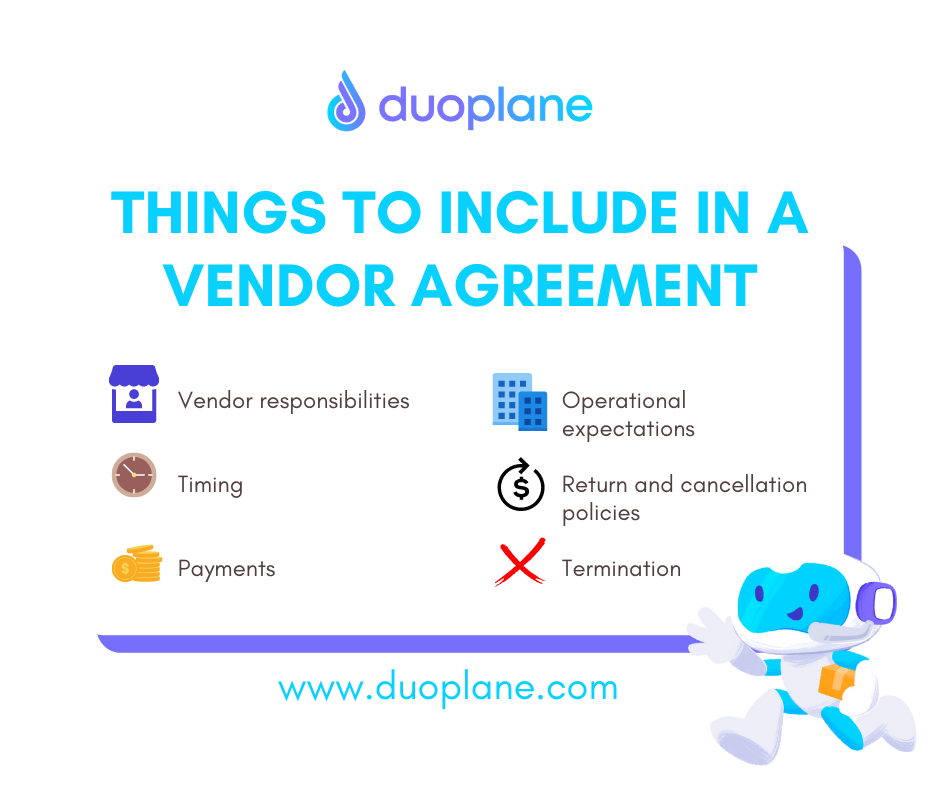
Getting Started on Duoplane for Vendors
Getting Started on Duoplane for Vendors June 19th, 2022 | 3 min read Hi Vendors, congratulations on making the best decision you’ll make all month.
If you have some power as a retailer, however, it is recommended to use the vendor contract to establish an upfront mutual understanding about how things work. While not overly formal, these contracts foster a mutual understanding that both parties are working toward the same goals.
With a vendor agreement, all parties involved should understand what is expected in terms of deliverables, payments, consequences, and termination. Equally important, it allows you as the retailer to mitigate your risk should expectations not be met.

If you decide to create a vendor agreement, here are some important topics to cover:
1) Vendor and Retailer Responsibilities
A vendor contract will describe the products or services included in the contract and how those products or services will be delivered. Clearly define exactly what each party expects from the other to avoid mistakes or incomplete tasks.
Some responsibilities that you may wish to include for your vendors are things like providing high quality digital images and providing product information in a structured digital format like Excel.
2) Operational Expectations
Operational expectations cover things like how long the average product will take to ship, what tracking information will be provided, and how order acknowledgements will be handled.
3) Cancellation Protocols
In this section, you will cover whether cancellations are allowed, when an order can be canceled, and who is responsible for handling the cancellation.
4) Return Protocols
Whose responsibility is it to take back the returns? Will the vendor take back the product or will the retailer hold the product? Additionally, in this section you should outline if advanced notice is required for returns.
5) Timing
Timing covers items including when the vendor will be paid, when the goods or services will be delivered and when the business relationship will end.
6) Payments
The payments section covers how vendors will invoice, how often and quickly vendors will get paid, and what additional fees (like dropship, shipping, and wholesale taxes) will be charged.
7) Consequences
Consequences detail what happens if either party fails to meet their obligations. Additionally, you may want to establish how parties can settle any disagreements and make everyone aware of the ramifications if they do not fulfill their terms of the contract.
8) Termination
This includes the contract length and what conditions and steps that must be taken to end the contract early.
9) Confidentiality
This details customer privacy protections. Namely, that customer information is required to be kept public and can only be used for fulfilling orders.
Firstly, you as the retailer will want to ensure that you are making the agreement. This enables you to set the terms and retain flexibility and avoid signing off on 20 different agreements with different legal jurisdictions.
With that said, you would also like to use this contract as a kind of sales document that demonstrates why you are a great partner to work with. Ensure you keep a non-adversarial tone throughout the entire contract and be sure to outline business terms, legal concepts, and consequences clearly.
If you’re a small retailer, before you create your agreement, be aware that vendor contracts also have the potential to disincentivize vendors from working with you. To make your business partnerships as easy as possible, consider what extra “hoops” you make your vendors jump through are actually necessary.
Vendor contracts have become less common over the past decade; however, if you’re interested in promoting your business and reducing your risk, check out our free vendor agreement for download.

Getting Started on Duoplane for Vendors June 19th, 2022 | 3 min read Hi Vendors, congratulations on making the best decision you’ll make all month.

5 Ways to Build and Maintain Strong Retailer Relationships July 14th, 2022 | 3 min read Strong, collaborative relationships with retailers are crucial to being

We chat with Katie Ouaknine of Badgley Mischka about her experience using Duoplane. The company loves how Duoplane seamlessly integrates with BigCommerce and automates their day-to-day operations. Katie’s favorite Duoplane features include splitting orders, auto-assigning orders, and managing multi-warehouse inventory.